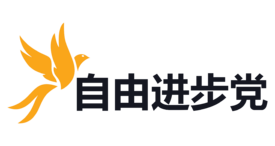Liberal Party of Monsilva
Liberal Party of Monsilva 山國自由進步黨 (Shānguó Zìyóu Jìnbùdǎng) | |
|---|---|
 | |
| Leader | Gao Jingyi |
| Shadow Senate Leader | Li She |
| Founded | July 1958 |
| Split from | Freedom and Democracy Party |
| Headquarters | Liberal Party Headquarters 38 Heping Street, Luhai 020717[1] |
| Membership (2022) | |
| Ideology |
|
| Political position | Centre |
| Colours | Yellow |
| Slogan | "最好的口才是把事情做好的口才。" ("The finest eloquence is that which gets things done.") |
| Second Chamber | 31 / 254
|
| First Chamber (Senate) | 16 / 75
|
| Legislators (total of all State Parliaments) | 145 / 718
|
The Liberal Party of Monsilva (Monsilvan: 山國自由進步黨, Pinyin: Shānguó Zìyóu Jìnbùdǎng, lit. "Monsilvan Liberal Progressive Party") or the Liberals, is one of the three main parties in the Monsilvan Republic, along with the RNP and the FDP. It has been an opposing party, and the third largest party in parliament since the 1980 general election. Although the party has never been in government, the presidential representative for the Liberal Party, Ling Mu won the 2003 Monsilvan presidential election, becoming the first Liberal Party president. Ling served one term and was defeated by incumbent president Chiu Zan in the 2008 Monsilvan presidential election. The party is at the centre of the political spectrum, and encompasses various ideological factions, with mostly similar views, but with some members leaning more towards liberal conservative politics and others remaining more towards the liberal left. The party currently has 31 Members of the Second Chamber, 16 Senators and 145 State Parliament Legislators. The Liberal Party is the leading party in only one state government: the Luhai State Government. Members of the Liberal Party of Monsilva are often referred to as "Liberals" or "自由人".
The Liberal Party was founded in July 1958 having been a faction within the People's Culture Party, the predecessor to the Freedom and Democracy Party, after the ideology of the party was beginning to lean more towards social democracy and away from liberalism. The Liberal Party saw limited success, failing to gain a single seat in parliament during the Kingdom of Monsilva. However, the Liberal Party did gain members throughout its time as a party not in parliament, and had much support throughout the 60s, with massive increases in membership during the 1970s. After the 1978 Monsilvan protests, some Liberal Party politicians were invited to the Provisional government of Monsilva and assisted the establishment of the republic after the successful referendum on the moanrchy. The first election under the new form of government was the 1980 general election, which was also the first election in which the Liberal Party won any seats.
The Liberal Party has never been the leading party in parliament, and has remained the third largest party since its entrance into parliament in 1980. However, it did have time in government in a coalition with the Freedom and Democracy Party after the 1996 general election, where the FDP won the most seats but failed a to reach a majority. When Suen Shi-huang, leader of the FDP at the time, approached Kong Tsai, who was leader of the Liberal Party, to form a coalition, he initially stated he was unsure, but after a week of discussions, they came to an agreement and formed a coalition which lasted until the 2000 general election, where the FDP won a majority which allowed them to end the coalition. During the period of the Liberal Party being partially in government allowed it to advertise its policies to the Monsilvan people. This was considered a success by the party, as the 2000 general election saw its highest number of votes and number of seats in the Monsilvan parliament.
In recent elections, the Liberal Party has seen an incredible increase to their popularity. As of December 2022, the Liberal Party currently ranks second in the polls for the next election, which is the first time a poll has ranked the party any higher than third. The current leader of the Liberal Party of Monsilva, Gao Jingyi, to announce they will be "focusing on becoming worthy of being the next official opposition party or even the next government", as opposed to their previous goals of "maintaining third place and putting pressure on governments for the benefit of the people".
The party has generally shown approval and had a positive stance on economic liberalism, promoting the free market whilst still having a strong agenda on wealth inequality. The party has also strongly supported improvements to social welfare in Monsilva and is usually one of the first parties to criticize the incumbent government on social issues. The party has an official stance of being for the Ostlandet Union (OU).
See also
- Federal government of Monsilva
- Reformed National Party (Monsilva)
- Freedom and Democracy Party (Monsilva)
Notes
- ↑ See also: Postal codes in Monsilva